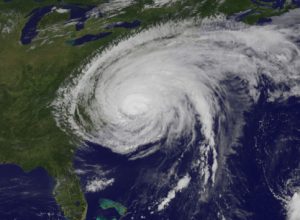Warmer temperatures are coming and we are all looking forward to them. While we typically associate the summer weather as a wonderful time to spend some time at the beach or with the family at a cookout, the summer months can bring with them some very dangerous weather conditions, namely hurricanes.
Hurricane season in the Atlantic region officially begins on June 1. Defined by their torrential rain and heavy winds, hurricanes have the ability to cause massive devastation. On average, 12 hurricanes make landfall the United States each year, and with so many major storms hitting different parts of the country in recent years, including Super Storm Sandy, which ravaged the New York area in 2012, it is very important to be prepared for the next potential storm.
With a long history of providing relief to those devastated by hurricanes, including sending personnel to assist the victims of Hurricanes Katrina and Maria, Jamaica Hospital Medical Center is experienced and knowledgeable about how to properly prepare for such an event and would like to share the following tips with our community:
- Stay informed by making sure you receive emergency notifications. There are many downloadable apps that can provide you with important information.
- Know your community’s evacuation plan in advance and identify the appropriate evacuation routes and potential safe shelters.
- Create an emergency notification plan for your family. This will help you contact one another and get back together if you are apart when a storm arrives.
- Prepare a “go bag” in the event you need to evacuate in a hurry. Contents of a go bag should include a flashlight, batteries, cash, first aid supplies and medications as well as critical documents.
- If you do not need to evacuate but there is a potential for prolonged power outages, make sure to have three to five days of water and non-perishable food items on hand for each member of your family.
- Prepare your home by reinforcing all exterior doors and windows, securing or bringing in any loose objects outside your home, cutting down any damaged tree limbs, and repairing damaged gutters to prevent leaks.
- While sometimes flooding is unavoidable, do your best to protect valuables by placing them in secure containers or relocating them to higher elevations.
- If you have purchased a generator, be sure to use it correctly. Remember to keep them outdoors, keep them at least 20 feet away from windows and doors and try to protect them from moisture.
By being prepared and following these tips, you can help keep your home and your loved ones safe from disaster.
For more information, please visit https://www.ready.gov/hurricanes
All content of this newsletter is intended for general information purposes only and is not intended or implied to be a substitute for professional medical advice, diagnosis or treatment. Please consult a medical professional before adopting any of the suggestions on this page. You must never disregard professional medical advice or delay seeking medical treatment based upon any content of this newsletter. PROMPTLY CONSULT YOUR PHYSICIAN OR CALL 911 IF YOU BELIEVE YOU HAVE A MEDICAL EMERGENCY.

